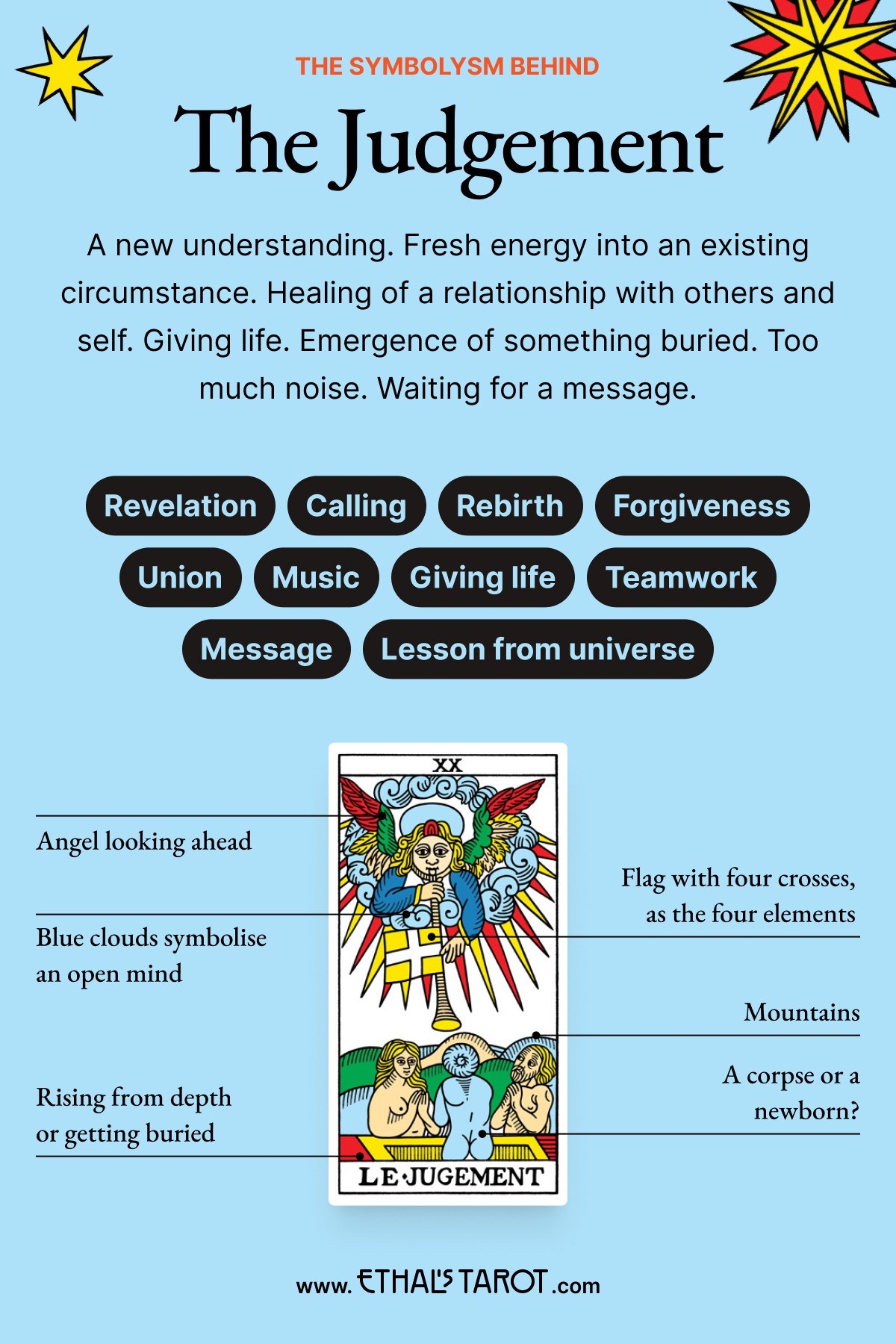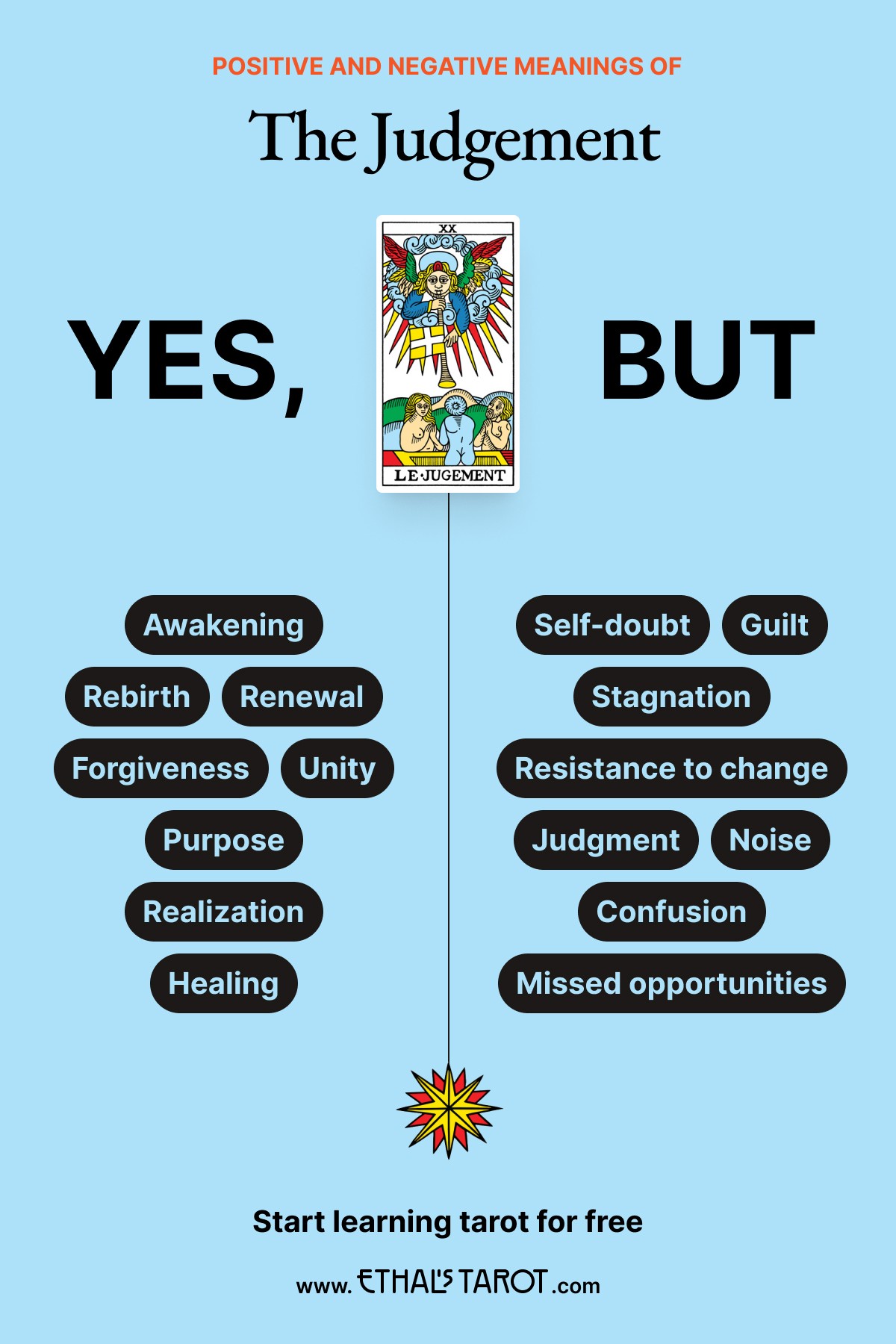Last updated
July 8, 2024
by Ethal Duval
The judgement card meaning in short
A new understanding. Fresh energy into an existing circumstance. Healing of a relationship with others and self. Giving life. Emergence of something buried. Too much noise. Waiting for a message.
A description of the judgement tarot card
The Judgment card is one of the final cards in the major arcana, which emphasizes its significance. It serves as a call for self-reflection and assessment in all aspects of life, foreshadowing the next world card. The card encourages you to consider your current emotional, intellectual, physical, and creative state. Take the time to appreciate the areas where you feel great and consider making changes in areas where you feel the need. Angel Gabriel’s gaze in the card is directed at you, emphasizing that this message is meant for you to reflect on and take action.
The couple
The couple at the bottom of the card also serves as a reminder that your actions not only affect yourself but also those around you. You are not alone in this world, whether it involves your loved ones or others on the planet.
The angel’s golden horn
The golden horn of the angel Gabriel emphasizes the importance of this message and suggests that it should be received with celebration. Maybe you or someone else is being too hard on yourself? This is a divine message after all, not urging you to rigorously practice biblical virtues, but to grow through kindness to yourself and embracing the message. You should feel good about striving to improve and it should resonate with your inner thoughts.
It could also signify noise, noise from being overly critical of yourself. Maybe you should evaluate yourself a little less and try to enjoy the world a little more. So either the angel's message is shining or it is blocking the sun.
The dead
The relationship with the dead has changed throughout the centuries. Death has become less prominent in our everyday lives, and we tend to not think about dying. However, this card serves as a reminder of the shortness of life and its fleeting nature.
It can also symbolize our relationship with the past and the unresolved issues from our history. Have you made peace with your past? Perhaps there are unresolved matters that you need to address.
The couple in the image is depicted as united with the dead, welcoming the message and being together with them. This may suggest that there are actions or thoughts you could explore to come to terms with your past.
The hills
There are also hills in the distance, reminding you that you will experience ups and downs. Reflecting and taking action is not easy; sometimes you will succeed and sometimes you won't. Change does take time and persistence.
Judgement meaning in Love
The Judgement card serves as a call to action. It invites you to reflect on your relationships. The horn on the card bears a flag with four quadrants or four suits, prompting you to consider the following themes:
How is your health and money in relation to your relationship?
What about sexuality?
How is your communication? Do you have fun topics to discuss, not just daily chores?
How do you feel emotionally?
If you're not currently in a relationship, it may be helpful to contemplate your feelings about a future partner or who you would want to see as your partner in the future.
The image of the deceased also encourages us to delve into the past. Perhaps there are unresolved issues or events from the past that you would like to address. Take some time to reflect on what you want to do with this. It could also be a prompt for you to work on something as a couple—whether it's improving communication, strengthening your emotional bond, focusing on your health or finances, exploring your sexuality, or pursuing educational and intellectual endeavors.
I really love the symbolism in the artwork, where the man is looking at the angel and the woman is looking at the man. Although this may suggest traditional gender roles, you are free to relate to either partner regardless of your gender.
The important message is that one partner is focused on the angel's message, while the other is focused on their partner. It highlights how our actions can influence our partners, and the significance of being aware of how our choices impact them. If your partner is responding to a divine call, it's important to consider how your reaction may affect them, and whether it requires compromise from you.
Remember to consider your romantic situation. Are you being true to yourself, or are you just seeing things through rose-colored glasses? Maybe something is missing, and you're not acknowledging it. The angel is looking at you, not your partner, so it's up to you to rely solely on yourself.
Judgement Card Meaning in Finances or Money
Take a moment to reflect on your finances. How do you currently feel about your relationship with money? Consider the four quadrants and think about various aspects of your financial life, such as your spending on basic needs and health, creative endeavors or hobbies, education, and emotions. Reflect on whether you are content with your financial allocation in these areas. This exercise encourages you to revisit your budget and balance sheet for evaluation. It's possible that you may need to allocate more funds to your health or adjust your spending on hobbies. Remember that your spending choices impact others, including loved ones and the environment. Consider how your purchases align with your values and their potential impact on the world.
Perhaps there is a complex financial decision you have to make. In that case, tarot invites you to reflect on the decision holistically. Nevertheless, be mindful about your next steps. Think about what makes sense and what will bring you long-term joy.
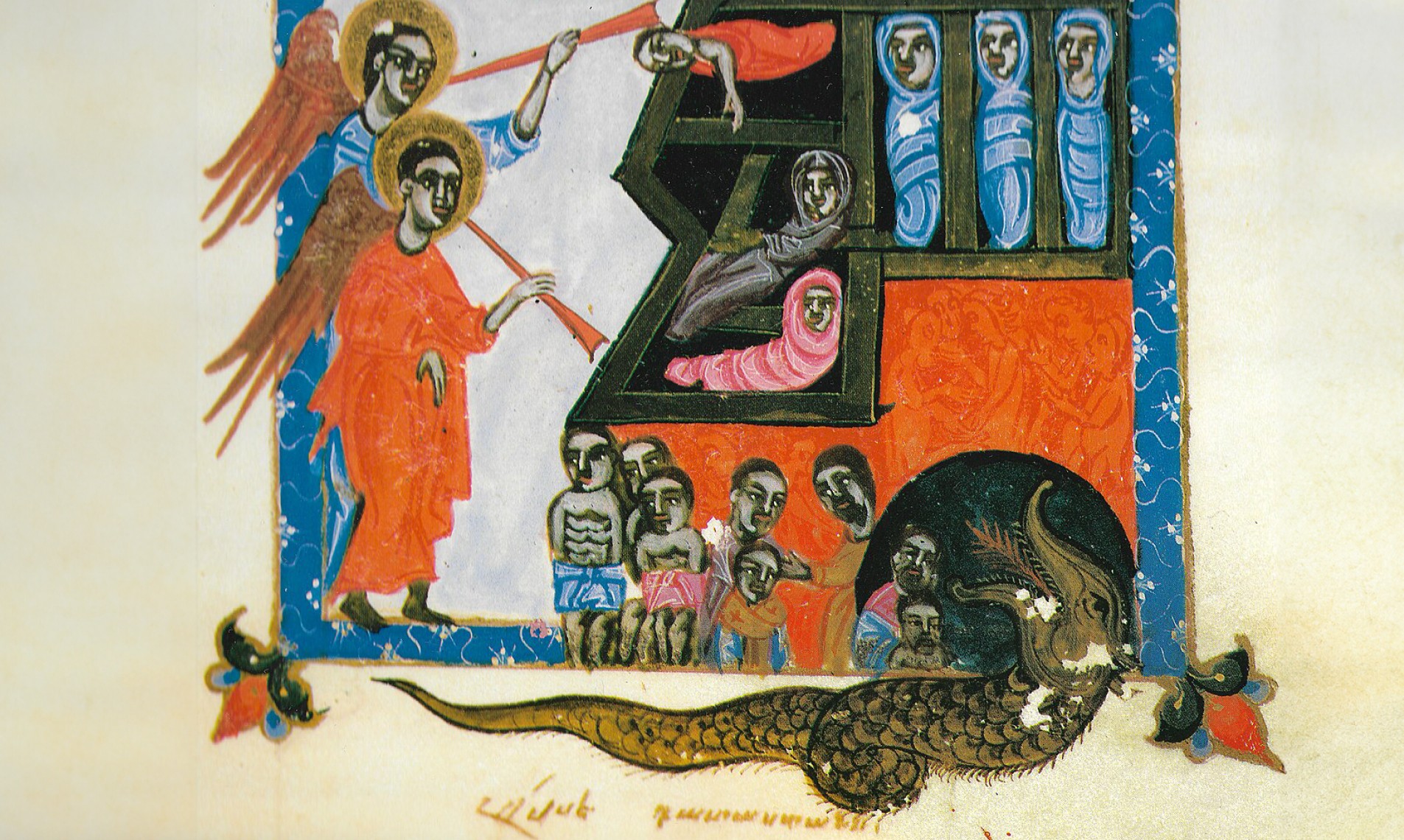
The historical themes in Judgement card
Tarot originated in the 15th century and has retained many religious themes, with judgement card being one of the most prominent. Before delving into the visual symbols, it's worth examining the historical concepts represented in this card.
The Day of Reckoning in the Judgement card
The concept of the Day of Reckoning or the Day of Judgment appears in many ancient Abrahamic religions, including Zoroastrianism, which predates Christianity. It holds significant power in human history and is referenced in Islam as well. In Christianity, the Day of Judgment is associated with the second coming of God, during which all people who have ever lived will be judged by God and either punished or rewarded. During judgment day, all the dead will rise, depicted as a blue figure rising from the crypt.
The good and the evil
The concept of judgment involves separating good from evil. Those who are good will be rewarded at some point, while those who are bad will face punishment. While most religions have clear definitions of good and bad, it's still up to you to figure this out for yourself. In a way, this concept parallels the principles of karma.
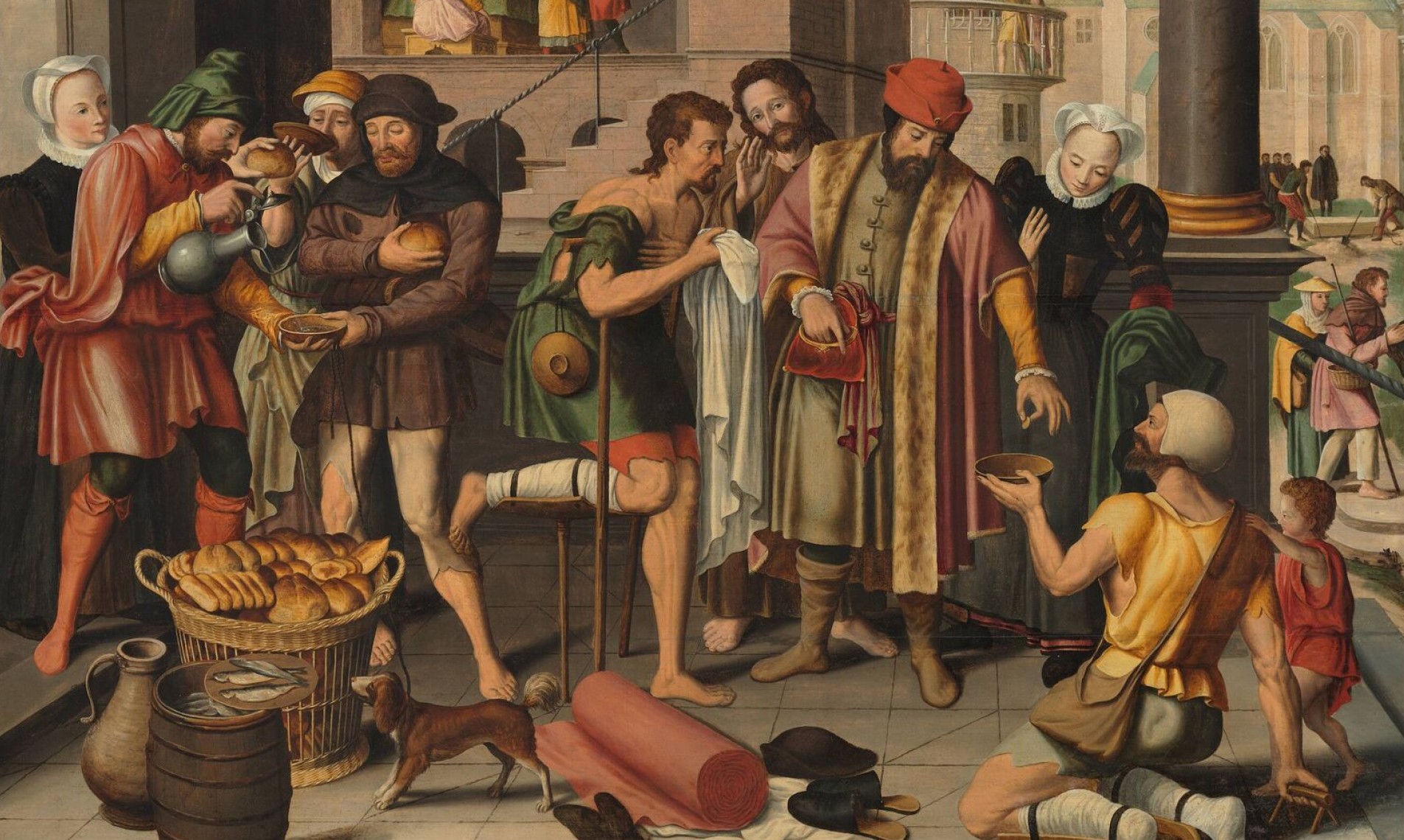
Works of mercy
In catholicism the decisive factor of the outcome of the judgement is the practice of works of mercy. In modern termsthese works of mercy are charitable acts towards other. These can be divided into physical or bodly needs of others, like feeding the hungry and spiritual works of mercy, such as comforting the afflicted, forgiving offenses. Of course it is up to you to construct what you believe in.
If we put the religious concepts to the side, the judgement may be present in your life, both from yourself and from others, but it is up to you to figure out how you feel about this.
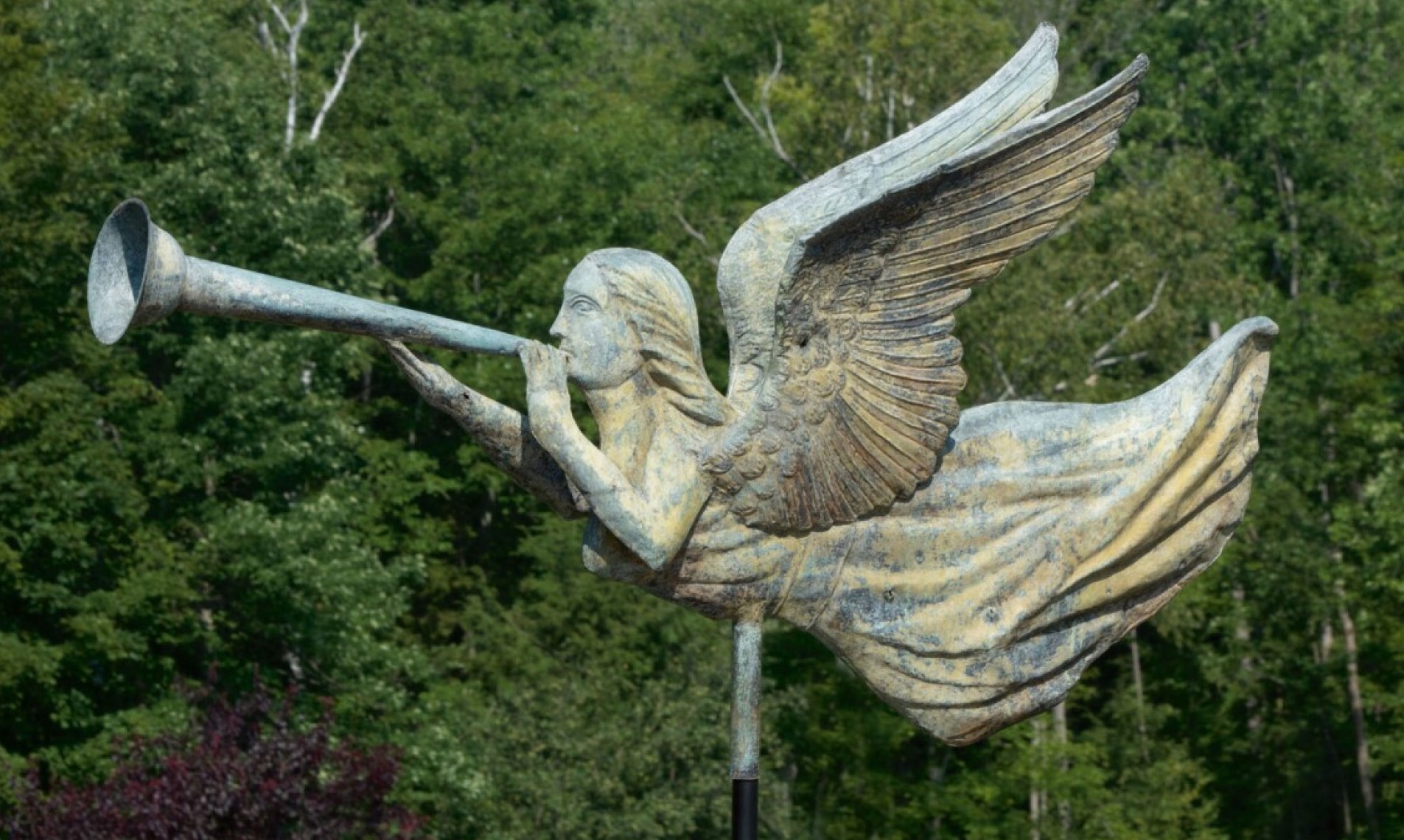
Angel Gabriel
According to Christianity, on the day of God's return, He will also bring all the angels before Him. There are a few angels in the Tarot, one of these is the Temperance. The angels can be either servants to God or protectors of the humans. The existence of angels can actually be a legacy of the polytheistic religions that included many gods. Although there are a few angels in Christianity, the angel we meet in the Judgment card most likely is Gabriel. As Gabriel is the angel who has the power to announce God's will to mankind. Perhaps you have noticed some statues around churches that have an angelic figure with a golden trumpet. Angel Gabriel also is found in Islam and Judaism. Gabriel is famously known for delivering divine messages. So, whatever this card is telling you, probably is of utmost importance.
Gabriel's symbolism in Christianity:
divine justice
victory of good over evil
transformative events
fulfillment of divine promises
bearer of good news, hope, and joy.
The golden flag and number four
If we observe the top of the card, we can see that Angel Gabriel's trumpet has a golden flag. In the Rider Waite deck, there is a white flag with a red cross. Regardless of the deck, the four squares of the angel do have the number 4. This can be a reference to the next card, The World, which clearly depicts the four elements as well as the four suits.
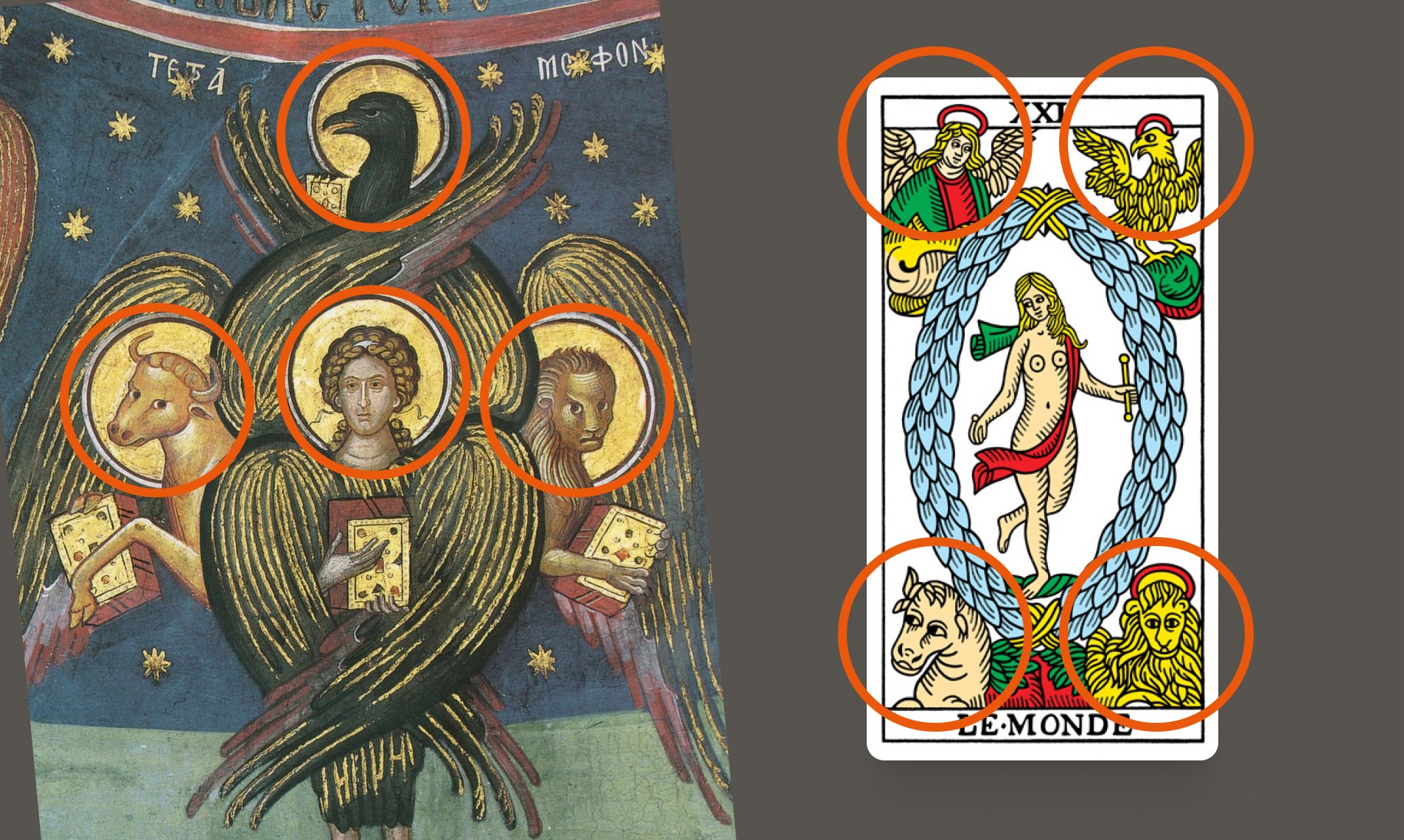
Cherubim
In Christianity, there are also cherubim with four faces - those of a lion, an ox, an eagle, and a human - which are the exact four characters found in the World card of the tarot. It can be said that the card is a message to welcome the day of judgment and to evaluate your actions. Are your actions balanced in the four suits - bodily, creative, intellectual, and emotional? Perhaps this is a calling to get something in order.
The Fool Meaning
The Magician Meaning
The High Priestess Meaning
The Empress Meaning
The Emperor Meaning
The Pope Meaning
The Lover Meaning
The Chariot Meaning
Justice Meaning
The Hermit Meaning
The Wheel of Fortune Meaning
Strength Meaning
The Hanged Man Meaning
The Death Meaning
Temperance Meaning
The Devil Meaning
The Tower Meaning
The Star Meaning
The Moon Meaning
The Sun Meaning
The Judgement Meaning
The World Meaning

